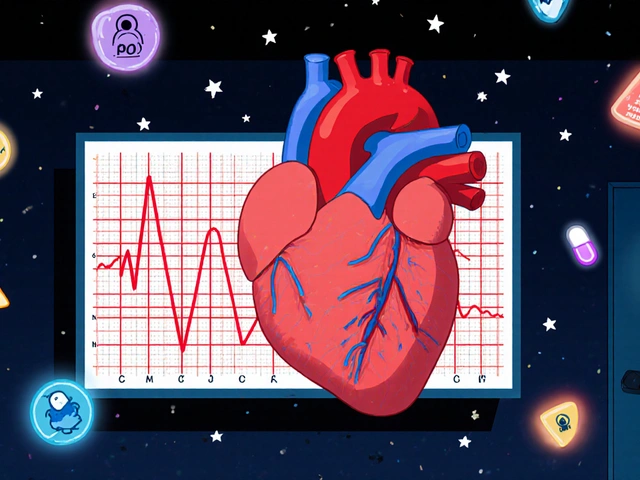When your doctor prescribes Isoptin (verapamil) for high blood pressure or angina, it’s not the only option on the table. Many people wonder if there’s something better, cheaper, or easier to tolerate. The truth is, verapamil works well for a lot of people-but it’s not perfect for everyone. Side effects like dizziness, constipation, or a slow heartbeat can make it hard to stick with. That’s why knowing your alternatives matters.
What Is Isoptin (Verapamil) Really Doing?
Isoptin is the brand name for verapamil, a calcium channel blocker. It stops calcium from entering heart and blood vessel cells. That relaxes your arteries, lowers blood pressure, and reduces how hard your heart has to work. It’s commonly used for:
- High blood pressure (hypertension)
- Chest pain from angina
- Some types of irregular heartbeat (like atrial fibrillation)
Verapamil comes in immediate-release tablets (taken 3-4 times a day) and extended-release versions (once or twice daily). The extended-release form is more common now because it’s easier to stick with. But even then, about 1 in 5 people report side effects that make them want to switch.
Top Alternatives to Isoptin (Verapamil)
There are three main classes of drugs that doctors use instead of verapamil for the same conditions. Each has different pros and cons.
1. Amlodipine (Norvasc)
Amlodipine is the most common alternative. It’s also a calcium channel blocker-but it works mostly on blood vessels, not the heart. That means it’s less likely to slow your pulse or cause constipation.
Studies show amlodipine lowers blood pressure just as well as verapamil, but with fewer people stopping treatment due to side effects. In one 2023 review of over 12,000 patients, only 8% quit amlodipine because of side effects, compared to 15% for verapamil.
It’s taken once a day. It’s cheap-generic amlodipine costs under £5 a month in the UK. And it doesn’t interact badly with most other meds. That’s why most GPs start with amlodipine now, not verapamil.
2. Lisinopril (Zestril, Prinivil)
Lisinopril is an ACE inhibitor. It works by blocking a hormone that narrows blood vessels. This lets blood flow more easily, lowering pressure.
It’s especially helpful if you also have diabetes or kidney disease. The British Hypertension Society recommends ACE inhibitors like lisinopril as first-line treatment for people under 55 without other complications.
But it’s not for everyone. About 10% of users get a dry, annoying cough. Some develop swelling in the face or throat (rare, but serious). If you’ve had that cough before on ACE inhibitors, you’ll likely get it again.
Lisinopril costs about £6 a month in the UK. It’s taken once daily. If you’re young and don’t have heart rhythm issues, it’s often a better first choice than verapamil.
3. Metoprolol (Betaloc, Lopressor)
Metoprolol is a beta-blocker. It slows your heart rate and reduces how hard your heart pumps. That’s great if you have angina or an irregular heartbeat.
It’s been around since the 1970s and still works well. But it can cause fatigue, cold hands, or trouble sleeping. People with asthma or severe depression often avoid it.
Unlike verapamil, metoprolol doesn’t cause constipation. But it can make your pulse drop too low, especially if you’re already on other heart meds. It’s also taken 1-2 times a day, depending on the version.
Generic metoprolol costs around £7 a month. It’s a solid option if your main problem is chest pain or fast heartbeat-but not ideal if your only issue is high blood pressure.
Comparison Table: Isoptin vs. Top Alternatives
| Drug | Class | Typical Dose | Side Effects Most Common | Cost (UK, monthly) | Best For |
|---|---|---|---|---|---|
| Isoptin (Verapamil) | Calcium channel blocker | 80-320 mg daily (extended-release) | Constipation, dizziness, slow heartbeat | £12 | Angina, atrial fibrillation, if other drugs fail |
| Amlodipine | Calcium channel blocker | 5-10 mg daily | Ankle swelling, flushing, headache | £5 | High blood pressure, especially in older adults |
| Lisinopril | ACE inhibitor | 5-40 mg daily | Dry cough, dizziness, high potassium | £6 | High blood pressure, diabetes, kidney protection |
| Metoprolol | Beta-blocker | 50-200 mg daily | Fatigue, cold hands, low pulse | £7 | Angina, fast heartbeat, post-heart attack |
When to Stick With Verapamil
Just because there are alternatives doesn’t mean you should switch. Verapamil still has its place.
If you have atrial fibrillation and your heart races unpredictably, verapamil is often more effective than amlodipine at controlling the rhythm. It’s also preferred if you have variant angina (spasms in heart arteries), where calcium blockers are the go-to.
Some people tolerate verapamil perfectly. If your blood pressure is under control, you’re not constipated, and your pulse is fine-there’s no reason to change. Many older patients in the UK have been on it for 10+ years with no issues.

When to Ask Your Doctor About Switching
Consider asking about alternatives if you’re experiencing:
- Constipation that doesn’t improve with fibre or laxatives
- Feeling dizzy when standing up
- Heart rate dropping below 50 bpm (unless you’re an athlete)
- Swelling in your legs or feet
- Cost is a barrier-verapamil is more expensive than amlodipine
Don’t stop taking it yourself. Talk to your GP or pharmacist first. They can help you switch safely. Stopping suddenly can cause rebound high blood pressure or chest pain.
What About Natural Options?
You might hear about magnesium, beetroot juice, or garlic lowering blood pressure. Some studies show modest effects-maybe 5-10 mmHg reduction.
But none of these replace prescription drugs for moderate to severe hypertension or angina. They can help as extra support, not substitutes. If you’re taking verapamil and want to try supplements, check with your doctor first. Some, like magnesium, can interact with calcium blockers and cause your heart rate to drop too low.
Real-Life Choice: A Case Example
Meet James, 68, from Bristol. He was on verapamil for 3 years for high blood pressure and occasional angina. He developed severe constipation and had to take laxatives daily. His GP switched him to amlodipine. His blood pressure stayed the same. His constipation vanished. He saved £7 a month. He didn’t notice any difference in his chest pain.
That’s the kind of win you can get with the right switch.

What If Nothing Works?
Some people need more than one drug. If one medication doesn’t control your pressure or pain, your doctor might add a low-dose diuretic (like indapamide) or a different class entirely. Combination pills (like amlodipine + perindopril) are common in the UK and cut down pill count.
For stubborn cases, your doctor might refer you to a cardiologist. There are newer drugs like ivabradine for heart rate control or ranolazine for angina-but these are usually last-resort options.
Final Thoughts
Verapamil isn’t bad. It’s just not always the best first choice anymore. Amlodipine is cheaper, better tolerated, and just as effective for most people with high blood pressure. Lisinopril is better if you have diabetes. Metoprolol shines if your main issue is a racing heart.
Don’t assume your current med is the only option. Ask your doctor: "Is there a drug that might work just as well but with fewer side effects?" That simple question could make your daily life easier.
Is Isoptin the same as verapamil?
Yes. Isoptin is the brand name for the generic drug verapamil. They contain the same active ingredient and work the same way. The only differences are cost and the inactive ingredients (like fillers), which don’t affect how the drug works.
Can I switch from Isoptin to amlodipine on my own?
No. Never stop or switch blood pressure medications without medical advice. Stopping verapamil suddenly can cause your blood pressure to spike or trigger chest pain. Your doctor will guide you through a safe transition, often overlapping the two drugs briefly before stopping the old one.
Which is better for angina: verapamil or metoprolol?
Both work well, but they’re used for different types. Verapamil is better for variant angina (caused by artery spasms). Metoprolol is better for classic angina (caused by narrowed arteries and higher heart demand). Your doctor will choose based on your specific diagnosis and test results.
Does verapamil cause weight gain?
Not directly. Unlike some beta-blockers, verapamil doesn’t typically cause weight gain. However, constipation from verapamil can make you feel bloated, which some people mistake for weight gain. If you’ve gained weight while on it, other factors like diet, activity, or fluid retention are more likely causes.
Are there any foods I should avoid with verapamil?
Yes. Grapefruit and grapefruit juice can interfere with how your body breaks down verapamil, making side effects worse. Avoid it completely while taking this drug. Also, limit alcohol-it can lower your blood pressure too much when combined with verapamil, causing dizziness or fainting.
How long does it take for verapamil to work?
For blood pressure, you may notice a drop within a week, but it can take 2-4 weeks for full effect. For angina or heart rhythm control, improvement can be seen in days, but optimal results often take a few weeks. Don’t expect instant results-stick with it and report back to your doctor after 4 weeks.
Next Steps
If you’re on Isoptin and wondering if you should switch:
- Write down your side effects-be specific. "I feel tired" isn’t enough. Say: "I get dizzy when I stand up after lunch, and I haven’t had a normal bowel movement in 5 days."
- Check your prescription cost. If you’re paying more than £10/month for verapamil, ask about generic amlodipine.
- Book a medication review with your pharmacist. They can spot interactions or suggest cheaper options.
- Ask your GP: "Is there a better fit for me?" Don’t wait until you’re miserable.
Medication isn’t one-size-fits-all. The right drug for your body might not be the one you started with. And that’s okay.







Comments
Joshua Casella
November 18, 2025 AT 17:26 PMVerapamil was my first go-to for hypertension, but the constipation was brutal. I switched to amlodipine and it was like night and day-no more laxatives, same BP control. Honestly, if your doctor doesn’t mention amlodipine first, ask why. It’s not just cheaper, it’s objectively better tolerated for most people.
Richard Couron
November 19, 2025 AT 09:13 AMThey’re all just pharmaceutical control tools. You think this is about medicine? Nah. It’s about who owns the patents. Amlodipine is cheap because the patent expired. Verapamil? Still overpriced because Big Pharma wants you dependent. And don’t get me started on how they bury the truth about side effects. The FDA’s asleep at the wheel.
Alex Boozan
November 20, 2025 AT 14:23 PMFrom a pharmacokinetic standpoint, verapamil’s first-pass metabolism via CYP3A4 makes it inherently more susceptible to drug-drug interactions than dihydropyridine CCBs like amlodipine. The latter has superior bioavailability and a longer half-life, which translates to more consistent 24-hour coverage with once-daily dosing. Also, the constipation profile is directly tied to its action on smooth muscle calcium channels in the GI tract-amlodipine has negligible effect there. So clinically, the data is unequivocal: amlodipine should be first-line unless there’s a specific arrhythmia indication.
mithun mohanta
November 22, 2025 AT 08:45 AMOhhh, so you’re telling me… that the ‘gold standard’ we’ve been fed for decades… is just… a corporate marketing ploy?!?!!? I mean, I’ve been on verapamil for 7 years, and yes, the constipation was like a daily punishment, but I never questioned it because… well, because doctors said so. Now I feel like I’ve been gaslit by Big Pharma AND my GP. This is the kind of revelation that changes lives. I’m switching to amlodipine tomorrow. I’m telling everyone. This post? This is the truth we’ve been starving for.
Don Angel
November 22, 2025 AT 12:31 PMMy dad’s been on verapamil since 2012. No side effects, BP perfect. He’s 82. I think it’s dangerous to generalize. If it ain’t broke, don’t fix it. Not everyone has the same experience.
benedict nwokedi
November 22, 2025 AT 19:12 PMLet’s be real-this whole ‘switch to amlodipine’ narrative is being pushed by insurance companies. They don’t care about your constipation, they care about the $7 vs $12 monthly cost difference. Meanwhile, metoprolol is being quietly revived for patients with anxiety-induced hypertension because it reduces sympathetic overdrive. The guidelines are shifting because of cost, not science. And they’re selling this as ‘patient-centered care.’
deepak kumar
November 22, 2025 AT 22:29 PMAs a pharmacist in Mumbai, I’ve seen this play out thousands of times. In India, verapamil is still common because it’s stocked in most government clinics. But when patients complain of bloating or dizziness, we switch them to amlodipine-always. The results are dramatic. One elderly woman said, ‘I haven’t felt this light in 10 years.’ Cost? Amlodipine is ₹15/month. Verapamil? ₹220. It’s not even a choice. The science is clear, the economics are clear, and the patient outcomes are clear. If your doctor isn’t offering this, ask for a second opinion.
Angela J
November 23, 2025 AT 23:20 PMWait… so… are you saying the government and pharma are hiding this? That my doctor’s been lying to me? I’ve been on verapamil for 5 years and I’ve had panic attacks because I thought my heart was failing when it was just constipation. I feel so violated. I need to talk to someone. Now.